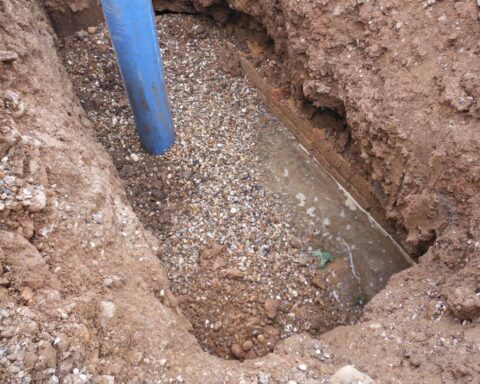Permeability Testing
BRE 365 and NHBC 5.3 (Formerly BRE 151) Soakage Test. Constant and Variable Head and Packer testing in Boreholes.
More Information Soakage testing or percolation testing is required on sites where it is intended to use a soakaway.
Soakage testing or percolation testing is required on sites where it is intended to use a soakaway.
The test determines the rate at which the ground absorbs a known volume of water. It ensures that the ground is suitable for a soakaway and that the soakaway is designed properly.
Typically, soakaways are used to collect surface runoff prior to being discharged into the surrounding soil. They are usually employed in areas where the surface run-off cannot be disposed into existing sewers or watercourses.
A soakaway is constructed in one of two basic forms. A conventional soakaway comprises a partially perforated cylindrical chamber, which allows the drainage of water into the surrounding soil.
In cases where impermeable soils overlie the permeable strata, the soakage must take place at depth and so a deep bored liner is used. This is known as a borehole soakaway. Here the water is transported from a sealed storage chamber to the soakage medium by a small diameter plastic or steel pipe, again perforated in part.
There are a number of permeability tests for measuring the rate of flow and determining whether soakaways may work effectively at a site. These range from small to large scale. Small-scale soakage tests are only applicable to draining relatively small areas. We have our own plant and equipment and can offer the following soakage testing methods:
We have considerable experience in undertaking site investigation soakage testing, both for conventional soakaway design, as well as the drilling, testing and installation for borehole soakaways.
BRE 365 and NHBC 5.3 (Formerly BRE 151) Soakage Test. Constant and Variable Head and Packer testing in Boreholes.
More InformationWe have considerable experience in undertaking permeability testing, both for conventional soakaway design, as well as the drilling, testing and […]
More InformationIf you have any questions about our services or would like to discuss how we could help you, please get in touch using our contact form below. Please provide as much information as possible about the nature of your enquiry, particularly the purpose of the investigation, the site address and postcode.
Any existing or proposed site plans are useful and can be attached beneath the message box. Please provide a contact address, email and telephone number. We will get in touch as soon as possible.